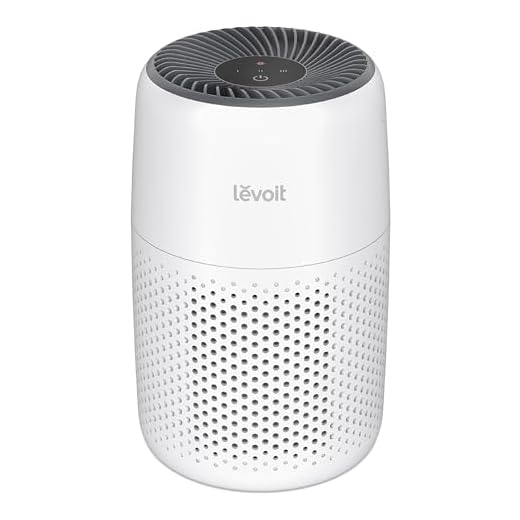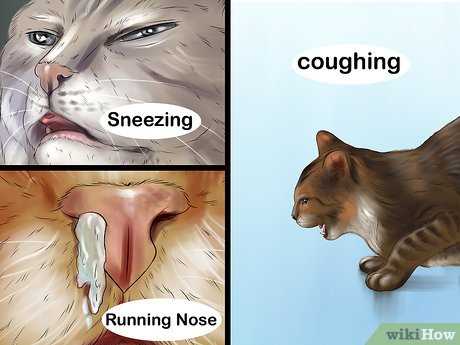



It’s essential to recognize that persistent throat clearing or hacking in felines can stem from various causes, and addressing them promptly is crucial for health. Commonly, hairballs are a frequent culprit, especially for long-haired breeds. Regular grooming can significantly reduce their occurrence, so I recommend a routine brushing to keep those pesky fur clumps at bay.
Allergies also play a significant role. Dust, pollen, and certain food ingredients can irritate the respiratory system, leading to coughing. Observing environmental changes and introducing air purifiers can help mitigate these reactions. If you notice a pattern, consult with your veterinarian to explore hypoallergenic diets or medications.
Infections, whether viral or bacterial, can cause respiratory distress. Symptoms such as coughing often accompany sneezing or nasal discharge. Keeping an eye on your companion’s overall health and seeking veterinary care at the first sign of illness ensures timely intervention. Remember, a healthy diet and regular check-ups contribute to strong immunity.
Lastly, underlying conditions, including heart disease or lung issues, may manifest as coughing. Regular vet visits allow for early detection and management of these health concerns. By staying proactive, you can ensure a longer, happier life for your furry friend.
Possible Triggers for a Feline’s Hack

Allergies can be a significant factor. Pollen, dust, and certain chemicals in the environment might irritate the throat. Keeping the living space clean and using air purifiers can help reduce these irritants.
Respiratory infections are another culprit. Bacterial or viral infections can lead to inflammation, causing episodes of hacking. Regular veterinary check-ups ensure timely diagnosis and treatment.
Foreign objects lodged in the airway often lead to distress. If you notice a sudden onset of distress, a trip to the vet is necessary to rule out any obstructions.
Exposure to smoke or strong odors can provoke discomfort. Ensuring a smoke-free environment and minimizing exposure to strong fragrances can alleviate symptoms.
Parasites, such as worms, can also cause irritation. Routine deworming and preventive measures are advisable for overall health.
Lastly, heart conditions might manifest through respiratory signs. If there’s a persistent issue, consulting a veterinarian for heart health assessment is recommended.
Common Causes of Coughing in Cats
Allergies are a frequent trigger for respiratory irritations. Pollen, dust mites, or certain food ingredients can lead to a persistent hacking. Observing for signs of environmental changes can help identify specific allergens.
Parasites such as roundworms or lungworms can irritate airways, causing distress. Regular deworming is advisable, especially if outdoor access is frequent.
Infections, whether viral or bacterial, can result in respiratory issues. Symptoms often accompany fever or lethargy. A vet visit is crucial for diagnosis and treatment.
Asthma and Bronchitis
Chronic conditions like asthma or bronchitis lead to inflammation of the airways, making breathing labored. Monitoring for wheezing or labored breathing can aid in timely intervention.
Foreign Objects

Occasionally, small items can become lodged in the throat, leading to sudden coughing fits. If this occurs, immediate veterinary assistance may be necessary to prevent choking.
When to Seek Veterinary Help for Your Cat’s Cough
If your feline friend experiences a persistent hacking sound lasting more than a few days, it’s time to consult a veterinarian. Immediate assistance is necessary if the sound is accompanied by labored breathing, lethargy, or a change in appetite.
Pay attention to any signs of distress. If your pet is producing mucus or blood, or if the noise is sudden and severe, don’t hesitate to reach out for professional help. Early intervention can prevent more serious health issues down the road.
Additionally, if your companion has been exposed to other animals showing respiratory symptoms, seeking advice is crucial. Regular check-ups are a good practice, especially for older pets or those with pre-existing health conditions.
Don’t ignore changes in behavior or habits. If you’ve noticed your furry buddy avoiding food or water, it’s essential to get a thorough examination. Remember, certain dietary choices can also affect overall health; for instance, learning about can cats eat fruits and vegetables might help you understand their nutritional needs better.
Keep an eye on your pet’s overall well-being. If you’re concerned about their condition or if coughing seems to worsen, trust your instincts and seek veterinary care. Staying informed is key to ensuring a long and healthy life; understanding how long do big cats live can give you perspective on their health journey.
It’s essential to recognize that persistent throat clearing or hacking in felines can stem from various causes, and addressing them promptly is crucial for health. Commonly, hairballs are a frequent culprit, especially for long-haired breeds. Regular grooming can significantly reduce their occurrence, so I recommend a routine brushing to keep those pesky fur clumps at bay.
Allergies also play a significant role. Dust, pollen, and certain food ingredients can irritate the respiratory system, leading to coughing. Observing environmental changes and introducing air purifiers can help mitigate these reactions. If you notice a pattern, consult with your veterinarian to explore hypoallergenic diets or medications.
Infections, whether viral or bacterial, can cause respiratory distress. Symptoms such as coughing often accompany sneezing or nasal discharge. Keeping an eye on your companion’s overall health and seeking veterinary care at the first sign of illness ensures timely intervention. Remember, a healthy diet and regular check-ups contribute to strong immunity.
Lastly, underlying conditions, including heart disease or lung issues, may manifest as coughing. Regular vet visits allow for early detection and management of these health concerns. By staying proactive, you can ensure a longer, happier life for your furry friend.
Possible Triggers for a Feline’s Hack

Allergies can be a significant factor. Pollen, dust, and certain chemicals in the environment might irritate the throat. Keeping the living space clean and using air purifiers can help reduce these irritants.
Respiratory infections are another culprit. Bacterial or viral infections can lead to inflammation, causing episodes of hacking. Regular veterinary check-ups ensure timely diagnosis and treatment.
Foreign objects lodged in the airway often lead to distress. If you notice a sudden onset of distress, a trip to the vet is necessary to rule out any obstructions.
Exposure to smoke or strong odors can provoke discomfort. Ensuring a smoke-free environment and minimizing exposure to strong fragrances can alleviate symptoms.
Parasites, such as worms, can also cause irritation. Routine deworming and preventive measures are advisable for overall health.
Lastly, heart conditions might manifest through respiratory signs. If there’s a persistent issue, consulting a veterinarian for heart health assessment is recommended.
Common Causes of Coughing in Cats
Allergies are a frequent trigger for respiratory irritations. Pollen, dust mites, or certain food ingredients can lead to a persistent hacking. Observing for signs of environmental changes can help identify specific allergens.
Parasites such as roundworms or lungworms can irritate airways, causing distress. Regular deworming is advisable, especially if outdoor access is frequent.
Infections, whether viral or bacterial, can result in respiratory issues. Symptoms often accompany fever or lethargy. A vet visit is crucial for diagnosis and treatment.
Asthma and Bronchitis
Chronic conditions like asthma or bronchitis lead to inflammation of the airways, making breathing labored. Monitoring for wheezing or labored breathing can aid in timely intervention.
Foreign Objects

Occasionally, small items can become lodged in the throat, leading to sudden coughing fits. If this occurs, immediate veterinary assistance may be necessary to prevent choking.
When to Seek Veterinary Help for Your Cat’s Cough
If your feline friend experiences a persistent hacking sound lasting more than a few days, it’s time to consult a veterinarian. Immediate assistance is necessary if the sound is accompanied by labored breathing, lethargy, or a change in appetite.
Pay attention to any signs of distress. If your pet is producing mucus or blood, or if the noise is sudden and severe, don’t hesitate to reach out for professional help. Early intervention can prevent more serious health issues down the road.
Additionally, if your companion has been exposed to other animals showing respiratory symptoms, seeking advice is crucial. Regular check-ups are a good practice, especially for older pets or those with pre-existing health conditions.
Don’t ignore changes in behavior or habits. If you’ve noticed your furry buddy avoiding food or water, it’s essential to get a thorough examination. Remember, certain dietary choices can also affect overall health; for instance, learning about can cats eat fruits and vegetables might help you understand their nutritional needs better.
Keep an eye on your pet’s overall well-being. If you’re concerned about their condition or if coughing seems to worsen, trust your instincts and seek veterinary care. Staying informed is key to ensuring a long and healthy life; understanding how long do big cats live can give you perspective on their health journey.
It’s essential to recognize that persistent throat clearing or hacking in felines can stem from various causes, and addressing them promptly is crucial for health. Commonly, hairballs are a frequent culprit, especially for long-haired breeds. Regular grooming can significantly reduce their occurrence, so I recommend a routine brushing to keep those pesky fur clumps at bay.
Allergies also play a significant role. Dust, pollen, and certain food ingredients can irritate the respiratory system, leading to coughing. Observing environmental changes and introducing air purifiers can help mitigate these reactions. If you notice a pattern, consult with your veterinarian to explore hypoallergenic diets or medications.
Infections, whether viral or bacterial, can cause respiratory distress. Symptoms such as coughing often accompany sneezing or nasal discharge. Keeping an eye on your companion’s overall health and seeking veterinary care at the first sign of illness ensures timely intervention. Remember, a healthy diet and regular check-ups contribute to strong immunity.
Lastly, underlying conditions, including heart disease or lung issues, may manifest as coughing. Regular vet visits allow for early detection and management of these health concerns. By staying proactive, you can ensure a longer, happier life for your furry friend.
Possible Triggers for a Feline’s Hack

Allergies can be a significant factor. Pollen, dust, and certain chemicals in the environment might irritate the throat. Keeping the living space clean and using air purifiers can help reduce these irritants.
Respiratory infections are another culprit. Bacterial or viral infections can lead to inflammation, causing episodes of hacking. Regular veterinary check-ups ensure timely diagnosis and treatment.
Foreign objects lodged in the airway often lead to distress. If you notice a sudden onset of distress, a trip to the vet is necessary to rule out any obstructions.
Exposure to smoke or strong odors can provoke discomfort. Ensuring a smoke-free environment and minimizing exposure to strong fragrances can alleviate symptoms.
Parasites, such as worms, can also cause irritation. Routine deworming and preventive measures are advisable for overall health.
Lastly, heart conditions might manifest through respiratory signs. If there’s a persistent issue, consulting a veterinarian for heart health assessment is recommended.
Common Causes of Coughing in Cats
Allergies are a frequent trigger for respiratory irritations. Pollen, dust mites, or certain food ingredients can lead to a persistent hacking. Observing for signs of environmental changes can help identify specific allergens.
Parasites such as roundworms or lungworms can irritate airways, causing distress. Regular deworming is advisable, especially if outdoor access is frequent.
Infections, whether viral or bacterial, can result in respiratory issues. Symptoms often accompany fever or lethargy. A vet visit is crucial for diagnosis and treatment.
Asthma and Bronchitis
Chronic conditions like asthma or bronchitis lead to inflammation of the airways, making breathing labored. Monitoring for wheezing or labored breathing can aid in timely intervention.
Foreign Objects

Occasionally, small items can become lodged in the throat, leading to sudden coughing fits. If this occurs, immediate veterinary assistance may be necessary to prevent choking.
When to Seek Veterinary Help for Your Cat’s Cough
If your feline friend experiences a persistent hacking sound lasting more than a few days, it’s time to consult a veterinarian. Immediate assistance is necessary if the sound is accompanied by labored breathing, lethargy, or a change in appetite.
Pay attention to any signs of distress. If your pet is producing mucus or blood, or if the noise is sudden and severe, don’t hesitate to reach out for professional help. Early intervention can prevent more serious health issues down the road.
Additionally, if your companion has been exposed to other animals showing respiratory symptoms, seeking advice is crucial. Regular check-ups are a good practice, especially for older pets or those with pre-existing health conditions.
Don’t ignore changes in behavior or habits. If you’ve noticed your furry buddy avoiding food or water, it’s essential to get a thorough examination. Remember, certain dietary choices can also affect overall health; for instance, learning about can cats eat fruits and vegetables might help you understand their nutritional needs better.
Keep an eye on your pet’s overall well-being. If you’re concerned about their condition or if coughing seems to worsen, trust your instincts and seek veterinary care. Staying informed is key to ensuring a long and healthy life; understanding how long do big cats live can give you perspective on their health journey.










